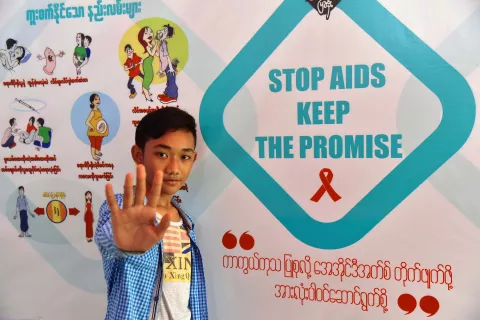Hopes for Women and Children Affected by HIV/AIDS
Hopes for Women and Children Affected by HIV/AIDS
Getting out of the car, Xian carried her husband on her back and slowly walked up the country road that twisted among fields of sugarcane all way up the mountain. Drops of sweat streamed down from her wrinkled face and fell into the pebbles at her feet. In the distance, she saw her daughter and son waving and jumping up and down. It's been months since the children have seen their father. But Xian knew this reunion would be short.
"My husband's AIDS developed into the late stage. Lying in the hospital bed, he kept pleading with me to take him home because he didn't want to burden us any more." The 39-year-old woman, also HIV positive, said with tears welling up. "Back home, my son kept asking me, 'Mom, you've said father will be home in three days. Now, why he isn't home yet?'"
A boy's dream
For her daughter Xiao Tuan and son Xiao Qi, life's sting came far too soon.
"I wish I could get rich so that I can buy lots of candies and eat as much as I want!" Xiao Qi said starry-eyed. Candies are a luxury for this 6-year-old boy. His 10-year-old sister already knew about the bitterness of life, "When I grow up I want to find a job and I will give all the money to my mother."
"The village children threw mud at them, and beat them with sticks. They said, 'they have AIDS patients, don't go to their home. They are poor as beggars, don't play with them.' My children never fought back. They came back home black and blue. Three of us hugged together and cried." Xian recalled.
"We used to live in a dilapidated house. In rainy days, you can't even write a word because the rainwater would wet everything on the paper." She said. "The women in the village wouldn't talk to me because we were dressed in rags."
Earlier this year, Xian received an RMB 1,000 loan in income generation support from UNICEF's project on care and support for mothers and children living with HIV. She was proud that when her husband returned, he could live in their newly-built house. She bought each brick and tile with every penny she saved from selling the pigs and chickens.
"Since our family economic condition is improving, nobody can look down upon us any more. I hope my children will study hard, and they can have a warm home. At least, they can stay with their father for a while and feel their home is still complete." Xian said.
Rising above despair
Tang Quanyu, a local All-China Women's Federation officer has witnessed the transformation of families affected by HIV/AIDS since UNICEF launched the income generation project to support HIV positive mothers in Yingjiang County two years ago.
Bordering Myanmar in southwestern Yunnan province, Yingjiang County had reported 2,953 HIV and AIDS cases by the end of 2007, including 556 women and 32 children. Most of the people got infected via injection drug use, but as the epidemic spreads into the general population via sexual transmission, more and more women and children are getting infected. The disease has now spread to all of the 418 villages.
"Up to now, over 70 HIV positive women, older orphans and affected families have received loans and skills training for animal husbandry or small business." Tang said. "This helps them get started with some income generation activities, as their loan applications are usually turned down by banks. They not only improved the family economy but also felt more confident and respected."
"In the past I didn't know a thing about the techniques of pig raising. The piglets often died for no reason. It took one year for the pigs to grow up to be sold in market." Wang, a 36-year-old HIV positive woman said. "After receiving training, the growth period is reduced to five months, and fewer pigs died. I've also learned how to mix the feed to reduce the cost."
The sale of pigs has brought Wang an income of over RMB 4,700, twice what she earned last year.
"In the past I didn't know whether I could support my daughter to finish her education or not. Now I have received free medicine from the government and the family conditions are getting better. I am confident that I can support her with every penny I save." She said.
Note: All the names of the affected women and children are changed in this article.



